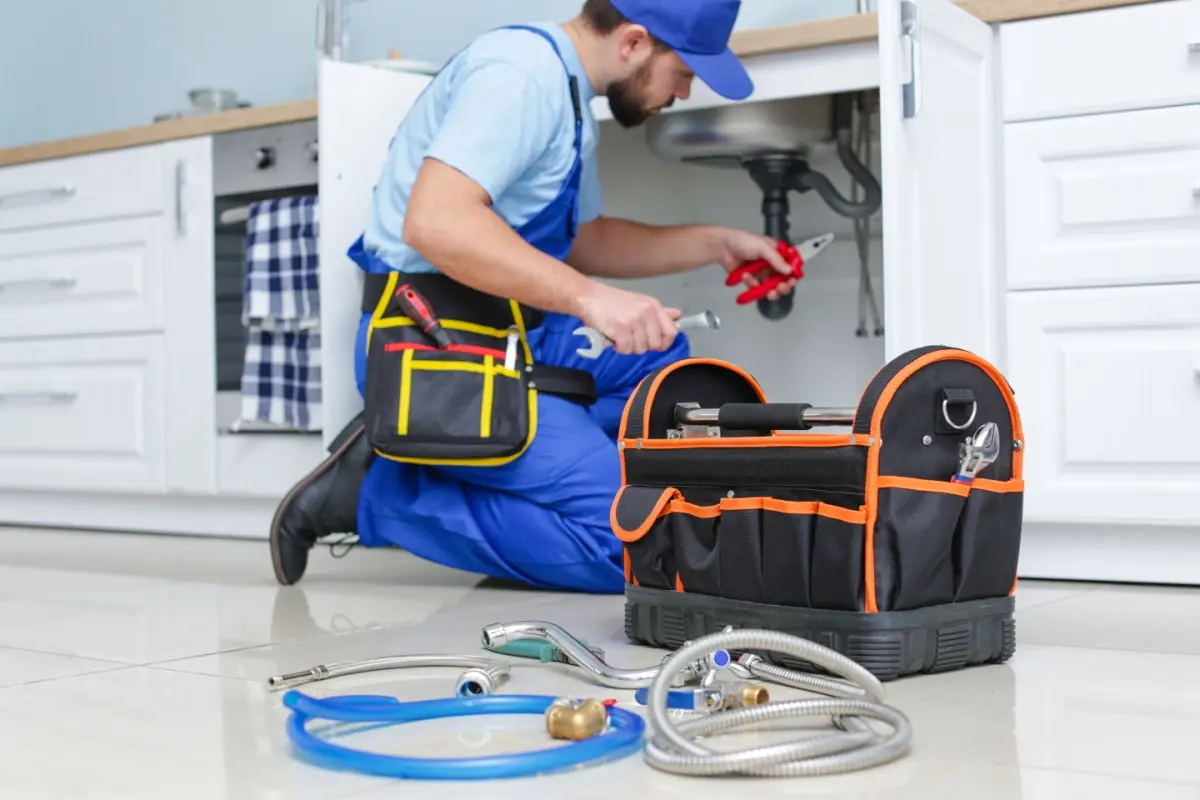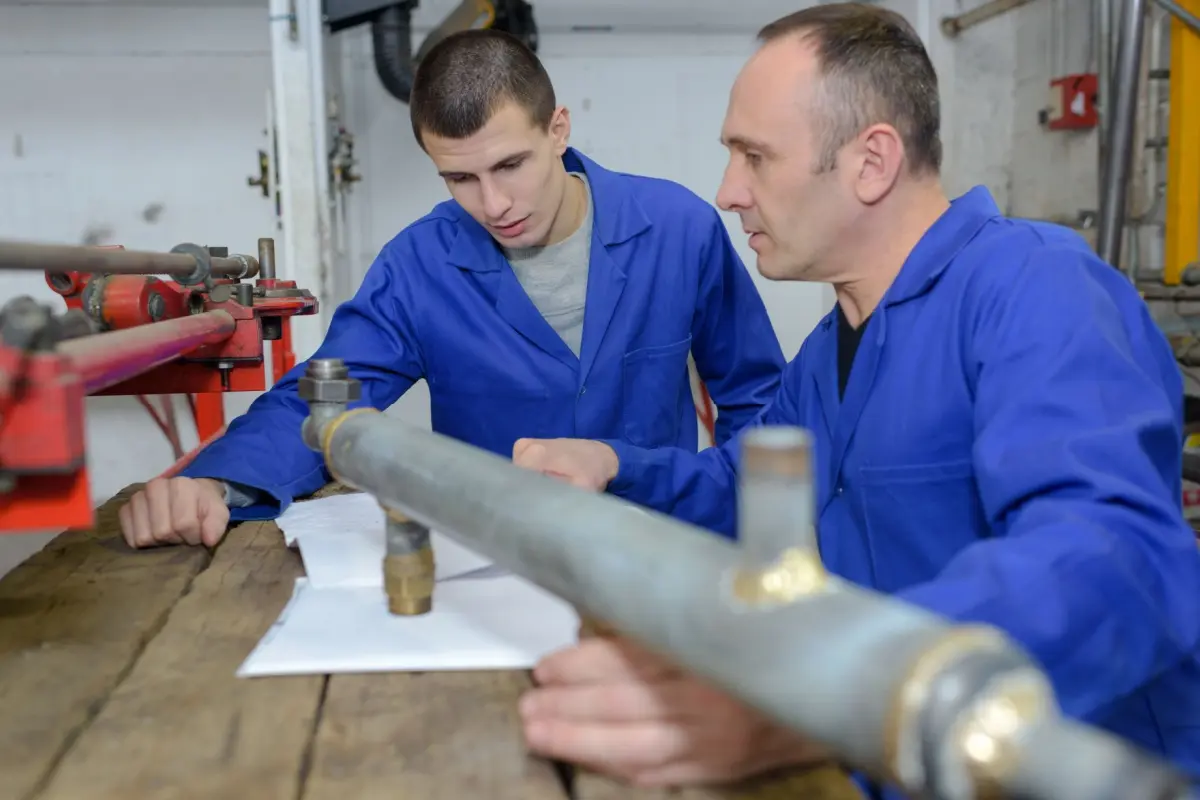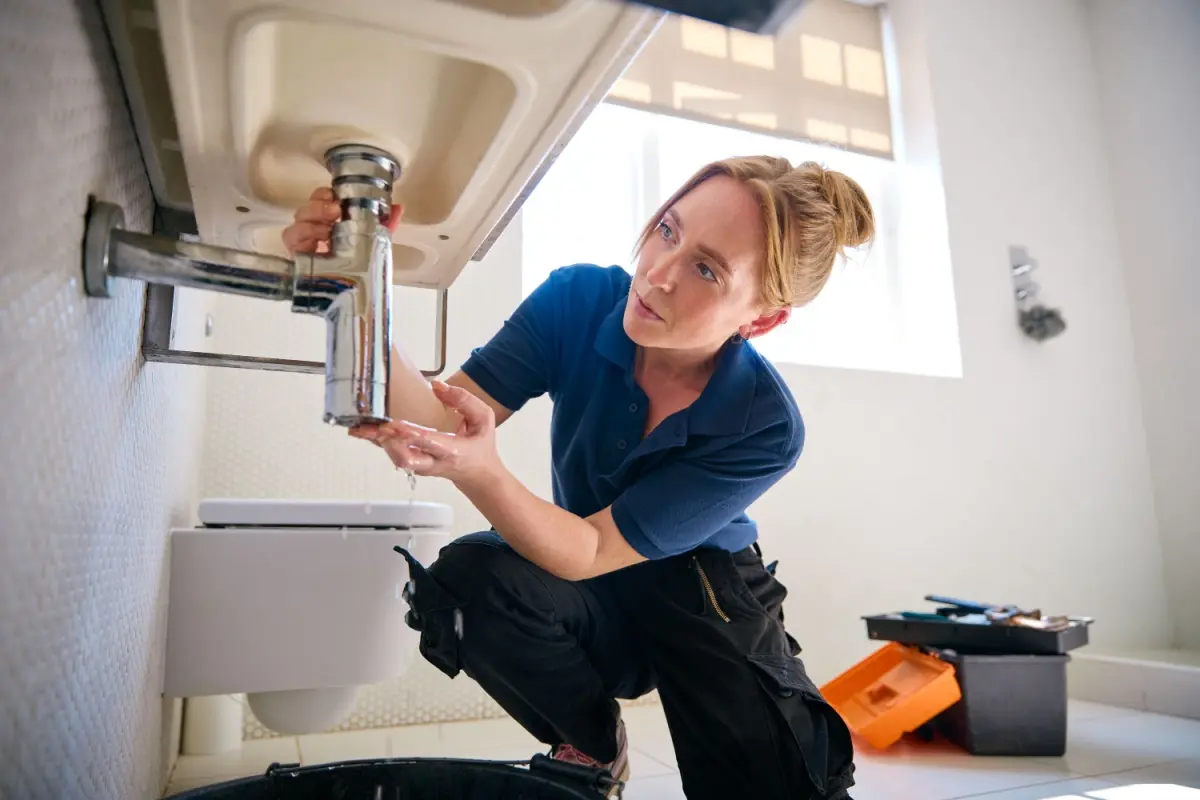Table of Contents
- What Are the Requirements to Become a Licensed Plumber?
- How to Get Your Plumbing License in 7 Steps
- Plumbing License Requirements by State
- How Long Does It Take To Get Your Plumbing License
- How Much Does a Plumbing License Cost?
- Benefits of Getting a Plumber’s License
- Potential Consequences of Operating Without the Appropriate Plumbing Licenses
- FAQ
With the demand for plumbing experts at an all-time high, starting a plumbing business can be a promising career choice. The industry offers stable salaries and a steady stream of work, but you need to get a plumbing license to capitalize on the rewards.

This comprehensive guide will answer every question you have about how to become a licensed plumber. We’ll walk you through the plumbing license requirements, how long it takes to get a plumbing license, and why the investment in your education is necessary for success.
What Are the Requirements to Become a Licensed Plumber?
While the education and legal requirements to earn a license vary by state, you’ll generally need to complete the following steps to become a licensed plumber:
- Education: Get a high school diploma, General Educational Development (GED) certificate, or associate degree. You’ll also need to complete a plumbing training program.
- Apprenticeship: Earn between two and five years of practical experience, often measured in hours, working under the supervision of experienced plumbers to gain practical skills and knowledge of the trade.
- Licensure: Obtain a plumbing license from the state board, which involves passing an exam before applying for the license.
How to Get Your Plumbing License in 7 Steps
Becoming a licensed plumber can take some time because it requires having hands-on experience you earn by shadowing a professional.
If you’re ready to learn about the trade, we’re here to guide you. Here’s a detailed breakdown of the steps you’ll need to take to earn your licenses.
1. Get a High School Diploma or GED
Graduating high school or obtaining a GED certificate is highly recommended for aspiring plumbers, as most apprenticeship programs — the recommended method for on-the-job learning — require completing this level of education.
Earning your GED is equivalent to getting a high school diploma, which suggests some proficiency in problem-solving and math. To obtain a GED, you need to be at least 16 years old and not enrolled in high school. You can access online study guides, enroll in preparatory classes, and register for the test through the official GED website.
2. Enroll in a Plumbing Apprenticeship (Training Program)
As part of your trade education and training, most states require that future plumbers complete vocational training by enrolling in an apprenticeship. An apprenticeship combines classroom instruction with on-the-job training. You might study plumbing codes and safety practices in a classroom, but you’ll spend the remainder of your training assisting a licensed expert on job sites. You’ll learn everything from how to install fixtures and repair systems to plumbing codes and equipment handling.

Plumbing apprenticeships are offered by local unions and trade schools in your area. You can also work with local plumbing companies that offer an apprenticeship to entry-level employees.
3. Log Lots of Hands-On Experience
As an apprentice plumber, you’ll gain practical experience by working under the supervision of licensed plumbers. Diversification is key — try working in various settings to gain exposure to all types of settings, such as residential, commercial, and industrial plumbing.

Keep a log of the tasks you perform and the hours you work (this will be required when applying for a plumbing license). The amount of hours you need to complete to get your license varies by state. For example, North Carolina requires 18 months (3,000 hours) of on-site full-time experience to be eligible for a license.
If you want to advance as a plumbing professional — say, from a plumbing apprentice to a journeyman plumber — you’ll need even more hours. As an apprentice in Massachusetts, you’ll need to complete 550 hours of classroom training and 8,500 hours of work experience before you can apply for the journeyman plumbing license with the Board.
4. Take the Licensing Exam
Next, you need to pass a state-specific exam to obtain your plumbing license. Visit your state’s licensing board website and get the details on exam dates, locations, and fees.
To become a licensed plumber in Florida, for example, you would visit the Florida Department of Business and Professional Regulation website to find exam information and experience requirements before applying for the license.
Plan to allocate enough time to study your materials and prepare for the exam. Many state licensing boards offer study materials, code books, and mock exams you can use to get ready for the exam. Consider taking an exam prep class offered by trade schools near you. You can also take timed practice exams to become comfortable with the format and time constraints.
5. Apply for a License
Upon passing the exam, you can apply for a plumbing license through your state’s licensing board. Gather the following documents ahead of time you’ll need to complete the application:
- Copies of your high school diploma, GED certificate, or transcripts from vocational training
- Work experience affidavits or letters signed by your supervising licensed plumber(s)
- Official exam results
- A photocopy of a government-issued ID
- Results from a state or federal background check
- Proof of application fee payment
6. Consider Specializing
Having a specialization as a plumber can enhance your marketability and earning potential. For instance, consider pursuing plumber certifications in niche areas such as backflow prevention, tankless water heater installation, or sustainable plumbing solutions. These specialized plumber certifications can enhance your skills, set you apart from competitors, and help you attract clients who value advanced expertise.
Start by identifying areas of interest, such as gas fitting or sewer line repair. For example, you can obtain a medical gas certification to work on hospital oxygen and vacuum systems.
Once you lock down this career path, seek additional training and certifications. These specialized training credentials can help you attract niche clients and more plumbing leads.
7. Maintain and Renew Your License
Each state requires plumbers to renew their licenses every one to three years. And while some licensing boards send out renewal reminders, it’s your responsibility to know the expiration date.
Many states also mandate a specific number of Continuing Education Units (CEUs) to renew your license. In Texas, for instance, plumbers must complete six hours of continuing education annually, which helps ensure you stay up-to-date on plumbing codes and tech.
Plumbing License Requirements by State
Each state has guidelines you must follow to become a licensed plumber. The table below categorizes states based on educational similarities, examination requirements, and the appropriate licensing authority.
| State | Minimum Education | Experience Requirement (Approx.) | Exam Requirement | Licensing Authority |
| Alabama | High school diploma or GED | 2 years apprenticeship | State exam | AL Plumbers & Gas Fitters Examining Board |
| Alaska | High school diploma or GED | 4 years (8,000 hours) apprenticeship | State exam | AK Dept. of Labor & Workforce Development |
| Arizona | Plumbing diploma or certificate program | Varies by jurisdiction | State exam | Arizona Registrar of Contractors |
| Arkansas | High school diploma or GED | 4 years (8,000 hours) apprenticeship | State exam | AR Dept. of Health, Plumbing & Nat. Gas Section |
| California | High school diploma or GED | 4 years (8,000 hours) apprenticeship | State exam | California Contractors State License Board |
| Colorado | High school diploma or GED | 4 years (8,000 hours) apprenticeship | State exam | CO State Plumbing Board |
| Connecticut | High school diploma or GED | 4 years (8,000 hours) apprenticeship | State exam | CT Dept. of Consumer Protection |
| Delaware | High school diploma or GED | 4 years (8,000 hours) apprenticeship | State exam | DE Board of Plumbing |
| Florida | High school diploma or GED | 4 years apprenticeshipLocal license requirements may differ | State Exam | FL Department of Business and Professional Regulation |
| Georgia | High school diploma or GED | 3 years experience | State exam | GA State Construction Industry Licensing Board |
| Hawaii | High school diploma or GED | 5 years (10,000 hours) apprenticeship | State exam | HI Dept. of Commerce & Consumer Affairs |
| Idaho | High school diploma or GED | 4 years (8,000 hours) apprenticeship | State exam | ID Division of Building Safety |
| Iowa | High school diploma or GED | State exam | IA Plumbing & Mechanical Systems Board | |
| Illinois | N/A | 4 years (8,000 hours) apprenticeship,144 hours of classroom instruction | State exam | Illinois Department of Public Health or City of Chicago |
| Indiana | N/A | 4 years (8,000 hours) apprenticeship | State exam | Indiana Professional Licensing Agency |
| Kansas | Varies by jurisdiction | Varies by jurisdiction | Varies by jurisdiction | Varies by jurisdiction |
| Kentucky | High school diploma or GED | 2 years experience | State exam | KY Dept. of Housing, Buildings & Construction |
| Louisiana | High school diploma or GED | ~5 years apprenticeship | State exam | LA State Plumbing Board |
| Maine | High school diploma or GED | 4 years (8,000 hours) apprenticeship | State exam | ME Plumbers Examining Board |
| Maryland | High school diploma or GED | ~4 years apprenticeship | State exam | MD Board of Plumbing |
| Massachusetts | High school diploma or GED | 5 years (8,500 hrs) + 550 hrs classroom | State exam | MA Board of State Examiners of Plumbers & Gas Fitters |
| Michigan | High school diploma or GED | 3 years (6,000 hours) apprenticeship | State exam | MI Dept. of Licensing & Regulatory Affairs |
| Minnesota | High school diploma or GED | ~4 years (~7,000 hrs) apprenticeship | State exam | MN Dept. of Labor & Industry |
| Mississippi | High school diploma or GED | ~4 years apprenticeship (generally) | May vary | MS State Board of Contractors |
| Missouri | Varies by jurisdiction | Varies by jurisdiction | Varies by jurisdiction | Varies by jurisdiction |
| Montana | High school diploma or GED | 5 years (~7,500 hours) apprenticeship | State exam | MT Board of Plumbers |
| Nebraska | High school diploma or GED | 4 years (8,000 hours) apprenticeship | State exam | NE State Plumbing Board |
| Nevada | High school diploma or GED | 4 years (8,000 hours) apprenticeship | State exam | Nevada Board of Plumbing Examiners |
| New Hampshire | High school diploma or GED | 4 years (8,000 hours) apprenticeship | State exam | NH Mechanical Licensing Board |
| New Jersey | High school diploma or GED | 1 year (1,200 hours) apprenticeship | State exam | State Board of Examiners of Master Plumbers |
| New Mexico | High school diploma or GED | 4 years (8,000 hours) apprenticeship | State exam | NM Construction Industries Division |
| North Carolina | High school diploma or GED | ~2 years (3,000 hours) apprenticeship | State exam | NC State Board of Examiners of Plumbing, Heating & Fire Sprinkler Contractors |
| North Dakota | High school diploma or GED | 4 years (8,000 hours) apprenticeship | State exam | ND State Plumbing Board |
| New York | Varies by jurisdiction | Varies by jurisdiction | Varies by jurisdiction | Varies by jurisdiction |
| Ohio | Varies by jurisdiction | Varies by jurisdiction | Varies by jurisdiction | Ohio Construction Industry Licensing Board |
| Oklahoma | High school diploma or GED | 3-4 years (6,000-8,000 hours) | State exam | OK Construction Industries Board |
| Oregon | High school diploma or GED | 4 years (8,000 hours) apprenticeship | State exam | OR Building Codes Division |
| Pennsylvania | Varies by jurisdiction | Varies by jurisdiction | Varies by jurisdiction | Varies by jurisdiction |
| Rhode Island | High school diploma or GED | 4 years (8,000 hours) apprenticeship | State exam | RI Dept. of Labor & Training |
| South Carolina | N/A | 1 year apprenticeship | State exam | South Carolina Department of Labor, Licensing and Regulation |
| South Dakota | High school diploma or GED | ~4 years (~7,600-8,000 hours) apprenticeship | State exam | SD Plumbing Commission |
| Tennessee | High school diploma or GED | 4 years (8,000 hours) apprenticeship | State exam | Tennessee Board for Licensing Contractors. |
| Texas | High school diploma or GED | 4 years (8,000 hours) apprenticeship | State exam | TX State Board of Plumbing Examiners |
| Utah | High school diploma or GED | 4 years (8,000 hours) apprenticeship | State exam | UT Division of Occupational & Professional Licensing |
| Vermont | High school diploma or GED | 12,000 hours apprenticeship | State exam | VT Dept. of Public Safety, Plumbing Board |
| Virginia | High school diploma or GED | 4 years (8,000 hours) apprenticeship | State exam | VA Board for Contractors |
| Washington | High school diploma or GED | 4 years (8,000 hours) apprenticeship | State exam | WA Dept. of Labor & Industries |
| West Virginia | High school diploma or GED | 4 years (8,000 hours) apprenticeship | State exam | WV Division of Labor |
| Wisconsin | High school diploma or GED | 5 years (8,000 hours) apprenticeship | State exam | WI Dept. of Safety & Professional Services |
| Wyoming | Varies by jurisdiction | Varies by jurisdiction | Varies by jurisdiction | Varies by jurisdiction |
*Requirements may change as state legislatures dictate. Please check with your local licensing authority for current requirements.
How Long Does It Take To Get Your Plumbing License
At this point, you might be wondering: how long does it take to become a plumber? The time it takes to complete the education and legal requirements vary by state, but you’ll typically need to complete two to five years of vocational and apprenticeship training before you can apply for a journeyman plumbing license.
Journeyman Plumber License
After meeting the educational requirements and completing your apprenticeship, you can apply for a journeyman plumber license. This involves passing a comprehensive exam that tests your knowledge of plumbing codes, systems, and practices.
The journeyman plumbing license allows you to work independently on most plumbing tasks.
Master Plumber License (Additional 1 to 5 Years)
If you aim to reach the highest level in the plumbing profession, you can pursue a master plumber license. Master plumbers have the authority to own and operate their own businesses, bid on projects, set service rates, and build a client base. In supervisory roles, master plumbers can oversee journeymen and apprentices.
Master plumber additional requirements and timeline:
- Accumulate the required number of work hours as a journeyman, typically a minimum of 2,000 to 4,000 additional hours of practical experience.
- Pass the master licensing exam and complete the paperwork to apply and receive your license.
How Much Does a Plumbing License Cost?
You’ll pay several fees to get your plumbing license. Here are the most common expenses.
| Fee | Estimated Cost |
| Education and training program | $1,000–$15,000 |
| Application | $50–$300 |
| Examination | $70–$300 |
| Study materials and exam prep | $50–$500 |
| License issuance | $75–$200 |
| Background check and fingerprinting | $25–$100 |
| License renewal (every 1 to 3 years) | $50–$300 |
Most plumbers are responsible for buying their own tools and equipment during their training period. Buying wrenches, pipe cutters, and inspection cameras can range from $500 to $2,000 or more, depending on the work you perform and the services you provide.
If you plan on opening your own business as a master plumber, you’ll need to buy enough insurance coverage to protect yourself and your business from claims. Some states require an additional surety bond to protect consumers against incomplete or faulty work, which can range between 1% and 10% of the bond amount.
Benefits of Getting a Plumber’s License
Obtaining a plumbing license can open numerous doors for your career and personal growth. Here are a few benefits to keep in mind.
Legal Compliance and Peace of Mind
A plumbing license ensures that you comply with state and local laws, allowing you to work without the fear of legal repercussions. As an example, in Texas, unlicensed plumbing work can result in fines of up to $5,000.
Increased Earning Potential
Licensed plumbers often earn significantly more than unlicensed ones, especially as you progress through the ranks to a master plumber. According to the U.S. Bureau of Labor Statistics, the mean annual wage for plumbers, pipefitters, and steamfitters is $67,840. In contrast, helpers in this trade earn just $39,400.
Enhanced Credibility and Trust
Homeowners are likely to hire a licensed professional to do the job because the credential signifies professionalism and a deep knowledge of the trade. Also, having liability insurance as a business owner helps assure homeowners they are protected during the project — it also protects you against accidents and disputes.
Access to Larger Projects
Many commercial and government projects require contractors to have proper licensing. If you’re considering diversifying and expanding, having a license opens up the potential to take on these opportunities to grow your business. Additionally, offering plumbing financing to your customers can help them take on larger projects they might otherwise delay. By offering financing, you make it easier for customers to proceed with larger projects, showcasing your focus on customer care and sustainable business growth.
Potential Consequences of Operating Without the Appropriate Plumbing Licenses
Operating without a license can lead to severe repercussions. Here are a few things you need to be aware of.
Legal Penalties and Fines
In some jurisdictions, unlicensed contracting is considered a misdemeanor or felony. In Florida, for instance, unlicensed work is punishable by up to a $10,000 fine.
Cease and Desist Orders
Authorities can issue orders to halt all unlicensed work. If persistent, these violations might lead to the permanent closure of your business.
Work That Fails Inspection
Unlicensed work will rarely pass inspection. This not only hurts your business’s reputation, it also puts your customers at risk. Some customers may refuse to pay for services upon discovering that a contractor lacks a license.
Becoming a licensed plumber is the most efficient way to establish yourself in the field. Licensed experts get to work on more projects, earn a stable income, and have easier access to state or government resources.
While it takes quite a bit of time to earn plumbing licenses, the steps are rather straightforward. Make sure you meet the education and experience standards before taking the exam and applying for the license. Specializing in niche areas like green tech or gas fitting can help elevate your career. Investing the time and resources into becoming licensed protects you and enhances your reputation.
FAQ
Still have some questions about how to become a licensed plumber? Allow our answers to clarify things.
What Soft Skills Do I Need for a Successful Plumbing Career?
Professional plumbers need good communication skills to interact with clients. They also need math, reading, and comprehension skills to read codes and technical manuals.
Are There Environmental Considerations in Plumbing?
Environmental sustainability is increasingly important in the plumbing industry. Plumbers can specialize in installing energy-efficient products and systems, such as solar thermal systems and water conservation systems.
What Are the Career Advancement Opportunities Beyond Becoming a Master Plumber?
Beyond being a master plumber, you can become a plumbing inspector, educator, or consultant on large-scale projects.
What Is the Difference Between Union and Non-Union Apprenticeship Programs?
Trade unions offer union apprenticeships, which often include comprehensive training, better wages, and benefits. However, they may have stricter entry requirements and can be more competitive. Private companies and contractors offer non-union apprenticeships. These might have more flexible schedules, but the job may come with lower wages and fewer benefits.
Do I Need Plumber Certifications Beyond My State License?
While not required by most states, plumber certifications can help you stand out. These voluntary credentials, obtained through industry organizations, can signal your expertise in areas like energy-efficient installations, water treatment systems, or complex commercial plumbing work.
Table of Contents
- What Are the Requirements to Become a Licensed Plumber?
- How to Get Your Plumbing License in 7 Steps
- Plumbing License Requirements by State
- How Long Does It Take To Get Your Plumbing License
- How Much Does a Plumbing License Cost?
- Benefits of Getting a Plumber’s License
- Potential Consequences of Operating Without the Appropriate Plumbing Licenses
- FAQ


